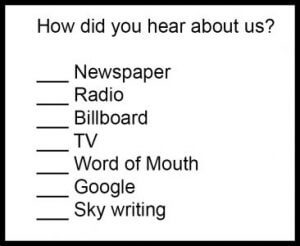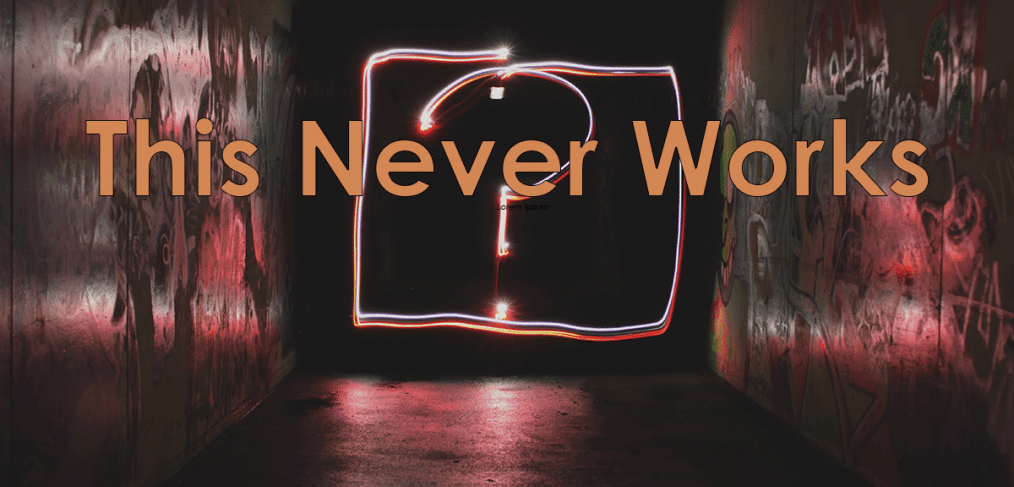Listen to the podcast here:
“How do you know your advertising is working?”
“I ask everyone how they heard about us.”
“Did you put toothpaste on your toothbrush this morning?”
“Of course. Crest.”
“How did you hear about Crest?”
“That’s different. I always use Crest.”
“That wasn’t my question. There was a point in your life when you never heard of Crest. Then you did. How did you hear about it?”
“I dunno, man. Maybe a TV commercial or something.”
“You sure? Crest does a lot of advertising in a lot of different media.”
“It’s what my Mom bought when I was a kid.”
“So, you heard about it from your Mom?
“I don’t know…it’s right there at eye level in the store I guess.”
“You heard about Crest from Proctor and Gamble’s merchandising strategy?”
“I don’t know! Why are you asking me this??!?”

Ahhh… yes. Why are you asking your customers this? Let’s set aside the folly of the faulty research for a moment. Think about what this is like for your customer.
If you’d like a visual example of what’s happening, watch this brief video:
A customer just came to you 100% prepared to give you money. But you’ve thrown a hurdle in front of him to ask a question that has no reliable answer.
“Oh, what’s the big deal?” you say.
It is a very small inconvenience, true. But why introduce any inconvenience?
Having an automated attendant and phone tree is a small inconvenience. But an inconvenience just the same.
Asking “can I get your zip code?” is a small inconvenience. But an inconvenience.
Keep adding these up and suddenly you’re not the customer-centric, friendly staff, conveniently located, business anymore. You’ve heard businesses say “to us, you’re more than just a number.” Well, Clyde…you are literally turning your customers into a number when you ask “how did you hear about us?”
You’re also asking him to answer an impossible question. Just like that tube of Crest, there’s no reliable way to get people to rewind their brains and reassemble the puzzle pieces in the right order to give you the answer you want to hear.
Neurologists and psychologists have been asking the question for over 100 years.
- Why did you choose a candidate (Gaudet, 1955)
- Why did you choose a detergent (Kornhauser & Lazarsfeld, 1935)
- Why did you choose your occupation (Lazarsfield, 1931)
- Why did you go to graduate school (Davis, 1964)
- Why did you become a juvenile delinquent (Burt, 1925)
- Why did you get married/divorced (Goode, 1956)
- Why did you join a voluntary organization (Sills, 1957)
- Why did you seek out a psychoanalyst (Kadushin, 1958)
- Why did you move to a new home (Rossi, 1955)
- Why did you fail to use a contraceptive (Sills, 1961)
 Instead of finding an answer to “why,” they learned that people didn’t realize that:
Instead of finding an answer to “why,” they learned that people didn’t realize that:
- There was something trying to influencing them.
- Their actions were a response to something.
- The thing trying to influence them caused their action.
(From “Telling More Than We Can Know,” Nisbett and Wilson, University of Michigan, Psychological Review Vol 84. No 3.)
Absent an FMRI scan of your customer’s brain (which is terribly expensive and noisy), you won’t get an answer. At best, the customer (trying to get out of this awkward situation) might say the last action he took (e.g.: “looked you up on Google”), or just blurt out some answer to get you to stop the interrogation (e.g.: “my friend told me” or “I just saw your sign”).
Roy Williams tested this with a major national plumbing company.
When asked “how did you hear about us,” the customer’s responses were:
-
31% heard about them from newspaper
-
24% saw their TV ad
-
19% said a referral
-
17% had no idea
-
4% heard it on the radio
-
5% said “other.”
100% of their advertising was on the radio. There never was a newspaper ad or a TV commercial.
You’re not going to get the answer…because it’s a question that cannot be answered.
How do you know if your advertising is working?
Measure something that is measurable:
- Did you make more money this year (pretty easy, yeah)?
- Has your name recognition increased (top-of-mind awareness studies are affordable and enlightening)?
- Are customers eager to tell their friends about you (Net Promoter Score® is designed to measure if your customers are genuinely happy with you, and help predict growth)?
Measure your marketing efforts. That’s important.
Stop making your customers do your research for you. That’s rude.
- Marketing Has a Physics Problem - December 3, 2025
- AI is OK - August 14, 2025
- Emotion in Advertising Equals Dollars in Business - December 3, 2024

